When we got back from Machu Picchu we had a day to recover before being picked up again at 4:30am to catch a local bus to a town on the edge of Manu National Park, called Pilcopata. 'Local bus' means no creature comforts, not that we expect much anymore. It was packed full of people as usual, picking up more and more passengers along the way and jamming them in the middle isle, screaming, pooing children included - at least it meant the bus stopped more often than usual for toilet breaks, although most of the pooing had already happened on the bus. By now we were just about used to it, but anyone who hadn't experienced The World's Most Dangerous Road in Bolivia already might join the crying, pooing babies - the roads inside the reserve were MENTAL.
We spent about 12 hours on the bus with a short breakfast break in between, and arrived at Pilcopata around 4:30pm where were met by Oliver from Manu Peru Amazon (his wife Carolina traveled from Cusco with us and gave us lots of info along the way which was a nice surprise). Lunch was served up in Pilcopata, a traditional fish dish. I was unlucky and got given the head. I wasn't really up for sucking out the eyes and scraping out it's brain so I had to pick at it and made it look like I'd eaten some. Luckily I'd had some bread and cheese on the bus an hour or so before.
Oliver had a rag tied around his hand and didn't seem to be 100%. We asked what had happened and he took off the rag to show us an extremely infected hand, literally about three times the size of his other one with a big piece of flesh bursting out of a hole in his thumb... he'd been bitten by a spider. He told us it'd happened in Cusco and not the jungle but I'm still not 100% sure whether he was just saying that to put us at ease. It was a shocking sight, but it was actually healed significantly after one of Tomasz's Tobacco ceremonies (read on and I will explain).
We reached our camp after a ride in Oliver's 4x4, him driving one handed, and a boat journey. The camp was three tents pitched on the shore of the river. The toilet was a spade which you had to take into the designated toilet area, dig a hole 20cm deep and do your business - watching out for snakes. Oliver assured us that this was the most eco friendly way of doing it, in a matter of days it would decompose and go into the ground naturally. The shower / bath was the river, and all food was cooked on the fire. There was no fresh drinking water, or so we thought, until we drank from the natural spring, which probably caused the landslide in the first place. I expected to get ill because you can't even drink out of the tap in S.America, but it was completely fine even though the water often had small stones and bits of twig in it.
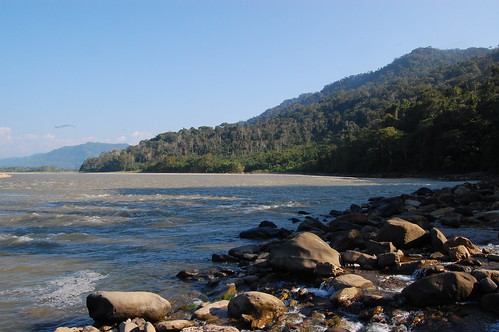
View of the river. Bang smack in the middle of the photo is the bushier part of the landslide where we camped.
Oliver and Carolina were really nice and we had a good feeling about the trip as soon as they started telling us about the project. At first we'd suspected we'd be clearing a bit of forest for a commercial project where some foreigners would be making loads of money, at the locals' expense, out of rich tourists who don't give a shit about the environment and throw sticks at animals to make them move for a decent photo - this wasn't what we'd signed up for but you never know what you're going to get in South America.
It turned out Oliver had been living in the jungle and learning to work with nature and local tribes for the last 20 years. There was a recent landslide in an area an hour or so up river from Pilcopata, which the government had given to him after some other work he'd done in the reserve. We arrived two months after the project began - the goal is to reforest the area, grow a botanical garden to preserve rare local plants, orchids and fruit, grow vegetables to eliminate the need for anyone at the camp to bring products from outside (which mean litter and more fuel for transporting them by boat), and to give to local villages who only grow bananas. And in terms of the camp, to create an environment where people who really want to experience life in the jungle and learn how to survive in the wild can come and do just that, with minimal impact to Manu National Park. Cool. So far so good. We were actually doing something good with our time. After all we'd paid $200 each to go there and volunteer for half of each full day (which turned out to be only 3 half days of work). We saw it more as a donation to help with the project. If we'd have been asked to chop a huge gash in the rain forest with chainsaws to clear space for an "eco-lodge" I don't know what we'd have done.
We slept surprisingly easily that night. It got dark at 6pm and the only source of light apart from our head-torches was a single candle under the palm shelter. Oliver took us from the tents on the shore up through the landslide in the dark, which was very slippery and had only two steps at that point (one of our projects for the time we were there), to the top camp. There was a small bamboo kitchen area, a shelter made of palm leaves, and a ripped up old canvass tent for the dining room. It was as basic as it gets and that's what made it such a good experience. Just walking between the tents and the top camp was amazing, we saw loads of night-time insects, including "click bugs", these small beetles with two luminescent spots that look like car headlights. They were a bit like toy cars, apparently the local kids play "Volkswagens" with them.

The top camp
After a really early night, we were up early for breakfast before getting to work. We were really motivated and still very naive to the humidity so we were very productive. It didn't take long for the heat to start dehydrating us, and the mosquito bites to really make things hard. Oliver and Carolina didn't really mind how much or how little work we did, they were really chilled, but we wanted to leave something visible behind us so me and JC decided to build steps up the worst part of the landslide, with the help of the girls to lay the stones towards the end, while they planted lots of orchids and jungle fruit in specially made bamboo troughs so they can grow safely and be replanted when they're bigger.
For the steps Oliver selected one Bolsa tree to cut down (all other wood is brought to the camp by the river naturally so there's no need to chop anything down that won't regrow very quickly, the Bolsa is quick growing and is split very easily so in this one case he made an exception). We did this with an axe and machete which was fun, and we made sure when it fell it didn't bring down any other trees. JC split the wood to make planks and I made the pegs and we ended up with some pretty sweet looking steps which worked well. All the stones were carried up from the river, very tiring in the blistering heat.
For the steps Oliver selected one Bolsa tree to cut down (all other wood is brought to the camp by the river naturally so there's no need to chop anything down that won't regrow very quickly, the Bolsa is quick growing and is split very easily so in this one case he made an exception). We did this with an axe and machete which was fun, and we made sure when it fell it didn't bring down any other trees. JC split the wood to make planks and I made the pegs and we ended up with some pretty sweet looking steps which worked well. All the stones were carried up from the river, very tiring in the blistering heat.
We were rewarded every day with some of the tastiest food of any tour we'd done so far, who'd have thought it in the jungle. We spent the afternoons either wandering around the camp looking at all the different types of butterflies and insects, or going on walks through the jungle with Oliver's crew, all working long term with him on the project, either local or from the surrounding areas, and really good guides. We went on a morning boat trip to see Parrots and Macaws lick clay down river (sounds weird but it makes sense), they do this every day to neutralise toxins in the fruit that they eat. We did a hike through the bush seeing all kinds of insects and plants along the way, ending up at a lagoon with lots of amazonian birds. And we went hiking into the forest to see The Big Tree - a 200 year old beast of a tree that shamans go to to carry out rituals and talk to the spirits. We walked for a couple of hours to get to it and it was the only one anywhere close to that size that we came across so you can see why it's special to the local people.
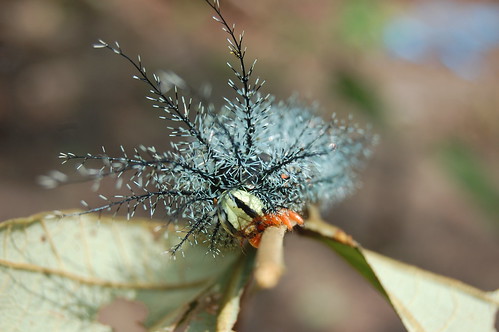
Caterpillar that looks like a firework display
As well as the friendly bugs there are nasty ones. There are two types of solitary ant, the ones we saw were about 5cm long and live entirely by themselves. If you get bitten by one apparently the pain is comparable with a Cobra bite, your vision goes red, the area that was bitten swells up for days and you get a terrible fever. No thanks.
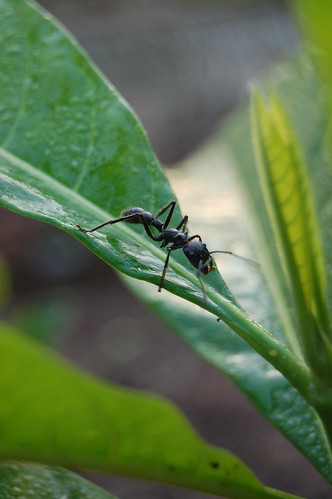
Solitary Ant
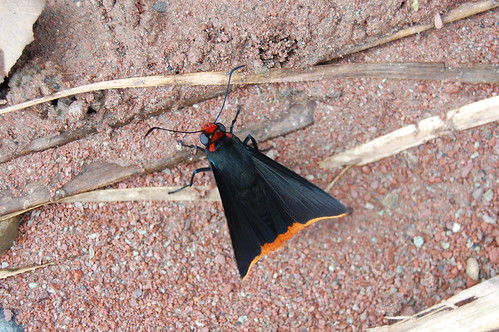
Cool Moth
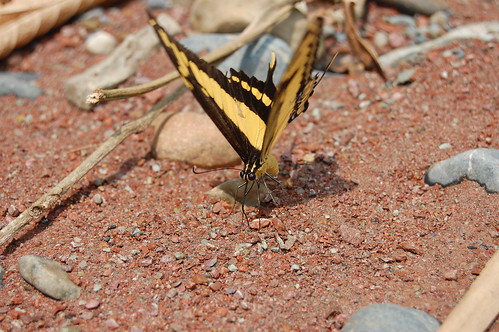
One of about a dozen types of butterfly that swarmed around the riverside
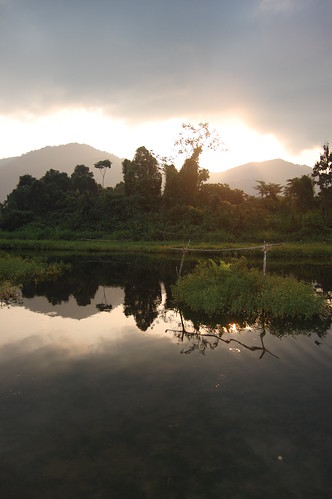
Reflections on the lagoon

One of my favourites - A real life wild stick insect!
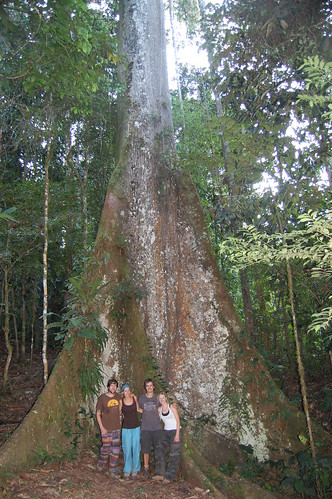
Us at The Big Tree
We were late finishing the lagoon trip and it was already getting dark, it didn't take long to get pitch black and walking back through the jungle for nearly an hour was an experience and a half. It was even better (or worse depending on how I think of it) by the fact there was a huge thunder storm as soon as the sun went down that lasted all night. When we got back to the tents both ours and JC and Manu's had fallen down. Shit! We were then told the river was likely to flood and if we didn't move everything up to the top camp we'd get washed away. Great. Oliver and the others were really helpful, somehow fixing all the broken tent poles with other broken bits melted on the fire and got the tents back up. We were sat having dinner in the "dining area" when everyone started shouting and swearing and telling us to get out... a tree was about to fall on us! We were all fine and the storm cleared up in the morning. In hindsight it was good fun and part of the adventure.
Then, the other notable experience of the 5 days... Tomasz's cleansing ritual with natural tobacco... Tomasz was also volunteering at the camp with us, he'd been there a week before us and was, probably what is best described as a trainee shaman. He wasn't a complete amateur pretending he knew stuff about the jungle's medicinal plants, he knew tonnes, he just wasn't quite experienced enough to carry out some of the more "in-depth", shall we say, ceremonies yet. He'd treated Oliver's poisoned hand with obvious effects the day before using tobacco leaves - it's really surprising how strong the medicinal effects of plants in the jungle can actually be, if I'd have heard this and not witnessed it I'd be very skeptical but it's powerful stuff, especially if you saw his hand in the first place and it'd been swollen up like a balloon for a good week beforehand.
Tomasz explained that wild tobacco leaves picked from the jungle can be boiled up into a concentrated tea and then drunk to get rid of toxins and unwanted nasties from your body, especially good for people with a European lifestyle who maybe go to the pub a bit too often... So we followed his instructions and ate very lightly the day before (we just ate fresh fish from the river that one of the guys had caught that morning and smoked them in leaves over the fire, amazing) and got up early in the morning with empty stomachs. Tobacco is one of 70 Vomit inducing plants in the jungle, each with special uses. Sounds like something you'd avoid back home - "alright guys, wanna drink some horrible tea that makes you puke your guts up violently and then leaves you feeling weak for the rest of the day?"..."Um, no not really"... but we were in the jungle and curious about it's effects and you don't get to experience these things every day.
We drank the first cup of tobacco tea at about 7am, it tasted BLOODY DISGUSTING! Like a very spicy beer that's been left on the side at a party with someone's cigarette butt in it. It kind of burned your throat as it went down. We started with one cup, followed by forcing down cup after cup of warm water to "fill yourself up until you go over" (Tomasz's words).. important to make the vomiting less unpleasant and to help you get so full you probably puke anyway. JC seemed to puke really effortlessly, and Victor, one of the locals who also did the ceremony. Me and Fia did not find it so easy. It's not often you really WANT to puke, you could feel this stuff churning away inside and knew that puking was inevitable so just wanted to get it out but it wasn't easy.
The tobacco made us very relaxed and made our heads clear, we sat and listened to the insects making no noise ourselves (except maybe the odd chundering noise, while forcing down more water and drinking another cup or two of tobacco tea). It was quite relaxing and felt like a kind of meditation, eventually we all vomitted... sat in a circle next to each other!!!! And for a while after we felt good - the relief of a good puke when you know it's been coming for a while!
We took it easy the rest of the day and decided we did feel a bit cleaner inside, if a bit weak from the lack of food. And it'd clearly gotten rid of a lot of crap from us... a bit of a natural enema too, not just the puking... So a clean, empty stomach and colon cannot be bad, especially after 3 months in South America.
Then, the other notable experience of the 5 days... Tomasz's cleansing ritual with natural tobacco... Tomasz was also volunteering at the camp with us, he'd been there a week before us and was, probably what is best described as a trainee shaman. He wasn't a complete amateur pretending he knew stuff about the jungle's medicinal plants, he knew tonnes, he just wasn't quite experienced enough to carry out some of the more "in-depth", shall we say, ceremonies yet. He'd treated Oliver's poisoned hand with obvious effects the day before using tobacco leaves - it's really surprising how strong the medicinal effects of plants in the jungle can actually be, if I'd have heard this and not witnessed it I'd be very skeptical but it's powerful stuff, especially if you saw his hand in the first place and it'd been swollen up like a balloon for a good week beforehand.
Tomasz explained that wild tobacco leaves picked from the jungle can be boiled up into a concentrated tea and then drunk to get rid of toxins and unwanted nasties from your body, especially good for people with a European lifestyle who maybe go to the pub a bit too often... So we followed his instructions and ate very lightly the day before (we just ate fresh fish from the river that one of the guys had caught that morning and smoked them in leaves over the fire, amazing) and got up early in the morning with empty stomachs. Tobacco is one of 70 Vomit inducing plants in the jungle, each with special uses. Sounds like something you'd avoid back home - "alright guys, wanna drink some horrible tea that makes you puke your guts up violently and then leaves you feeling weak for the rest of the day?"..."Um, no not really"... but we were in the jungle and curious about it's effects and you don't get to experience these things every day.
Tobacco leaves drying in the sun
We drank the first cup of tobacco tea at about 7am, it tasted BLOODY DISGUSTING! Like a very spicy beer that's been left on the side at a party with someone's cigarette butt in it. It kind of burned your throat as it went down. We started with one cup, followed by forcing down cup after cup of warm water to "fill yourself up until you go over" (Tomasz's words).. important to make the vomiting less unpleasant and to help you get so full you probably puke anyway. JC seemed to puke really effortlessly, and Victor, one of the locals who also did the ceremony. Me and Fia did not find it so easy. It's not often you really WANT to puke, you could feel this stuff churning away inside and knew that puking was inevitable so just wanted to get it out but it wasn't easy.
The tobacco made us very relaxed and made our heads clear, we sat and listened to the insects making no noise ourselves (except maybe the odd chundering noise, while forcing down more water and drinking another cup or two of tobacco tea). It was quite relaxing and felt like a kind of meditation, eventually we all vomitted... sat in a circle next to each other!!!! And for a while after we felt good - the relief of a good puke when you know it's been coming for a while!
We took it easy the rest of the day and decided we did feel a bit cleaner inside, if a bit weak from the lack of food. And it'd clearly gotten rid of a lot of crap from us... a bit of a natural enema too, not just the puking... So a clean, empty stomach and colon cannot be bad, especially after 3 months in South America.
On the last day we got up at 5am to watch the sun come up and saw loads of colourful birds flying about to wherever they go in the day, this included a pair of toucans who nested in the tree above our tents. It was a really nice way to finish the trip. And we managed to get a close up look at a Macaw in Pilcopata on our way back which was cool.
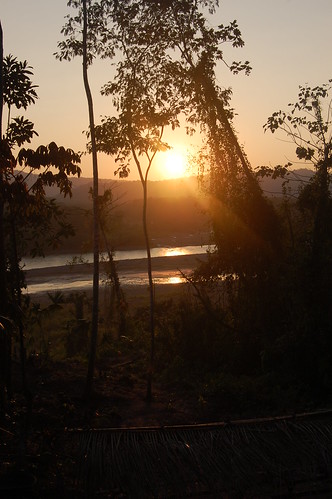
Sunrise at the camp
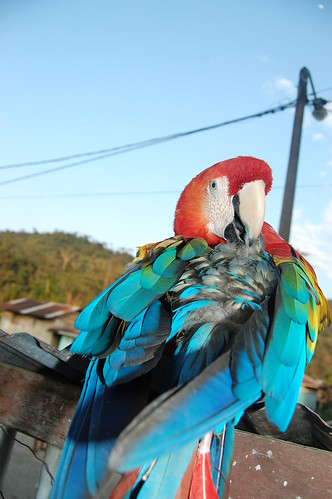
Macaw
We returned to Cusco for a couple of days to finally chill out and arrived in Arequipa yesterday morning. Unfortunately that meant parting with JC and Manu which was quite sad, but we will see you again some time in the future we promise :o)
Tomorrow we're getting up at 3am to start a 3 day trek in the Colca Canyon which should be awesome but very tiring, AGAIN, but also the last hike we do in South America. In two weeks we'll be in New Zealand living in a van - crazy!
And your reward for reading this all the way to the end - I got bitten on the cock by an ant. It wasn't a solitary ant but it did sting. And it took a few bites before I realised what it was. There you go. Well done you.
Tomorrow we're getting up at 3am to start a 3 day trek in the Colca Canyon which should be awesome but very tiring, AGAIN, but also the last hike we do in South America. In two weeks we'll be in New Zealand living in a van - crazy!
And your reward for reading this all the way to the end - I got bitten on the cock by an ant. It wasn't a solitary ant but it did sting. And it took a few bites before I realised what it was. There you go. Well done you.
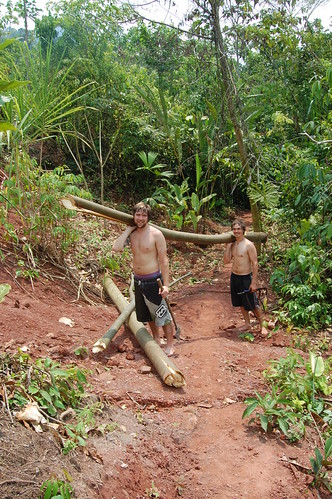


Epic.
ReplyDeletePuts the tactical chunder into sharp perspective innit. Loving your bloggage guys, proper travel writing!
P
i wish i was the ant
ReplyDeleteAnts in your pants
ReplyDelete